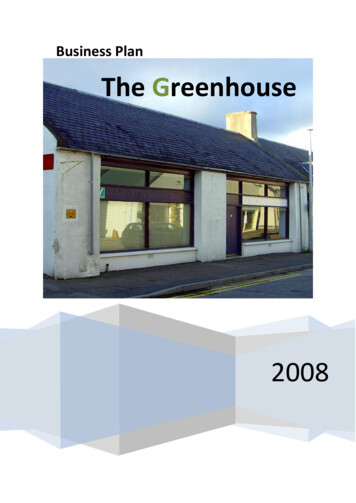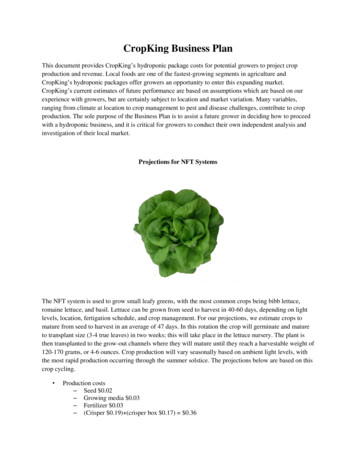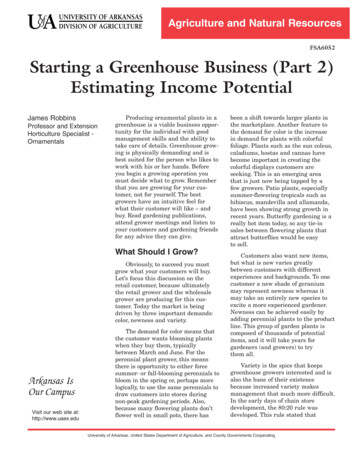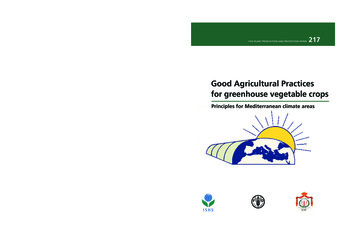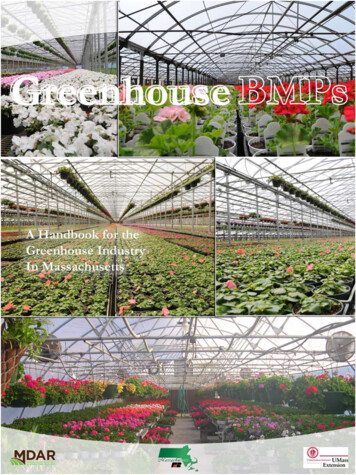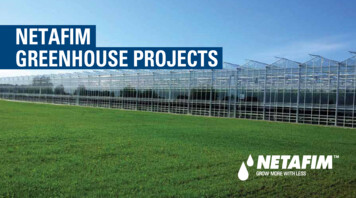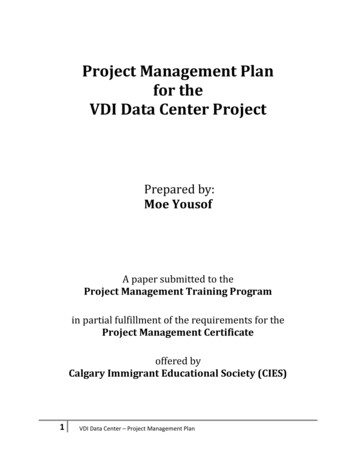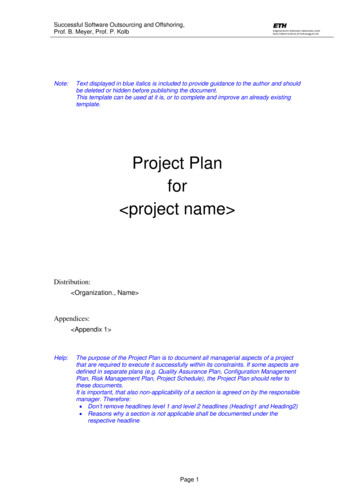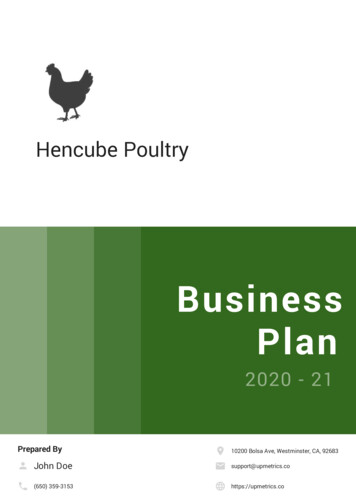
Transcription
The Greenhouse ProjectA Ron Wood Family Resource Center ProgramA community greenhouse and gardengrowing a healthier and greener Carson City.Business PlanMarch 8, 2010The Greenhouse ProjectA Nonprofit Nevada Corporation963 Topsy Lane Suite 306/381Carson City, Nevada 89705Telephone: 775.232.8626Karen AbowdProject house.html
Table of ContentsExecutive Summary . 1The Organization . 2Project History .Site Selection .Fundraising .Operations .2345Mission and Vision Statements . 5Objectives .Accomplishments .Short Term .Long Term .6677Management and Personnel . 7Partnerships. 8Market Analysis . 8Competition . 9Marketing Strategy . 9Operations of the Greenhouse . 9Facility .Education .Supply .Start-up Summary.10101010Potential Funding Sources . 11Financials . 12One Year Operation Expenses . 12Sources and Uses Statement . 13
AppendixAction/Advisory Group for Greenhouse ProjectBoard Members for Greenhouse ProjectBy-LawsCDBG Application QuestionsCSA – Community Supported Agriculture Program InformationExamples of Working Community GardensGreenhouse Manager Job DescriptionGreenhouse Policies and ProceduresGreenhouse Unit Design Layout & SpecsLetters of SupportMarket Analysis Research DataNevada Dept of Education – Ag & Natural Resources Science StandardsPotential Funding Sources Exhibit ARelated ArticlesRon Woods Family Resource Center Memorandum of UnderstandingSite MapsVolunteers Hours by Project and Individuals
Executive SummaryThe Greenhouse Project is a Nevada non-profit corporation whose mission is to establish andsustainably operate a community-based greenhouse and garden in Carson City. The projectoperates under the auspices of the Carson City Cultural Commission and its Special CitizenAction Group, and is a nonprofit program operating under the Ron Wood Family ResourceCenter, a 501(c)(3) tax-exempt organization.The Greenhouse Project will provide educational and vocational opportunities for students, youthgroups and special needs individuals in a garden setting and serve as a year-round source oflocally-grown agricultural and horticultural products for the Carson City community. Thegreenhouse operations will rely on renewable energy sources for power and use ecologicallysustainable growing methods to cultivate vegetables, flowers, and bedding plants.The greenhouse will serve as a teaching facility for hands-on training programs that emphasizeenvironmental stewardship, civic engagement and academic achievement. Through theseprograms, students will cultivate and distribute vegetables for school culinary classes and localfood banks and will produce flower baskets for the downtown Carson City corridor.In addition to providing youth educational and vocational opportunities, The Greenhouse Projectwill also serve the needs of Carson's low-income community by increasing access to fresher,more nutritious food supplies. The project also promotes revitalization of Carson City'sdowntown commercial corridor by enhancing its appearance through horticultural arts.The Greenhouse Project will support these programs from sales of cut flowers via a communitysupported agriculture program, local business sponsorships of the flower baskets, and annualfundraising events that include a benefit concert, silent auction, and a celebrity-chef dinner andart show. Grants from a variety of government and private sources are also being sought.The greenhouse and garden will be located on a one-acre site on the Carson High Schoolcampus. Estimated start-up costs are 125,000, and include construction of a 2,160 square-footgreenhouse, site improvements, utility hookups, mechanical and plumbing systems, andinstallation of alternative energy systems for wind, solar and geothermal power.To date, fundraising efforts have raised 17,000 in cash donations and an additional singlepledge of up to 50,000 in matching funds. Volunteer labor has also been pledged for theconstruction of the greenhouse and related site work.Local professionals have donated the legal, accounting, engineering, construction management,and real estate services needed to incorporate as a nonprofit entity, request 501(c)(3) status,evaluate sites, negotiate a lease with the Carson School District, apply for special use andbuilding permits, and compile grant applications. Agriculture and government professionals in1
the Carson community have also contributed their expertise in creating a viable business plan forthe project’s operations. Similar in-kind contributions are pledged for the development of thealternative energy systems, educational programs, and on-site recreational activities.The Greenhouse Project has the potential to grow and distribute 4,500 pounds of produceannually. With local food banks and low-income individuals receiving 90% of the production,the project will provide nutritious, locally grown vegetables to approximately 3,000 people amonth. The remaining produce will be donated to the Carson High culinary program to ensurethat the culinary students have a steady source of seasonal vegetables year-round.And, at least 200 students are expected to participate in The Greenhouse Project’s educationaland vocational programs. The grade schools, middle schools and high school as well as WesternNevada College will be involved, as will youth enrolled in after school programs. Communityoutreach programs will extend the educational opportunities to interested adults, involving themin activities such as master and junior master gardener classes.Finally, the Greenhouse Special Citizen Action Group organized the production and care of 90hanging flower baskets in 2009 and anticipates the same production level in 2010. TheGreenhouse Project will assume responsibility for these flower baskets, continuing this vitalcontribution to the revitalization of Carson City’s downtown corridor each summer.The OrganizationThe Greenhouse Project is a nonprofit Nevada corporation operating under the Ron WoodFamily Resource Center, a 501(c)(3) tax-exempt organization. A Special Citizen Action Groupof the Carson City Cultural Commission supports the project as a broad-based advisory council.The corporation’s Board of Directors and the Citizen Action Group are professionals in the fieldsof horticulture, agriculture, law, arts, marketing, accounting, construction, youth and businessdevelopment, grants administration, and parks and recreation. Action Group members alsorepresent the Carson City School Board, Cultural Commission, and Planning and BusinessDevelopment Departments, as well as local nurseries, organic farmers, UNR CooperativeExtension Service, local professionals, downtown businesses, and the Downtown Carson CityFarmer’s Market.Project HistoryThe Greenhouse Project concept started in November 2008 with the Carson City CulturalCommission, an advisory board to the Carson City Board of Supervisors, whose mission is toforward civic and economic benefit for Carson City and the State of Nevada. CulturalCommission member Karen Abowd proposed that the Commission undertake a project toincrease agricultural and horticultural arts in Carson City. To this end, a Special Citizen Action2
Group of over 35 members was formed and, in February of 2009, the group presented the projectto the Board of Supervisors. The project won the Board’s approval together with its commitmentof staff resources to aid in establishing a community greenhouse.Karen Abowd’s original concept was to build a greenhouse to produce hanging flower basketsfor Carson City’s downtown business district. The Action Group, however, envisioned thegreenhouse as a community facility that would serve a broader purpose and also provide a hubfor people of all ages to engage in cooperative, healthy activity. Thus, the project was expandedbeyond the production of flower baskets to include educational and vocational programs that willultimately serve as a source of fresh produce for local food banks and school programs.Site SelectionFor the past year, the organization’s primary focus has been on locating a suitable site for thegreenhouse. A total of seven sites were reviewed, with Carson High School offering the bestoverall location.Three members of the Action Group – Karen Abowd, Kathy Halbardier and Jennifer Pruitt –explored site options based on criteria such as the site’s proximity to schools and publictransportation, site improvement and utility hook-up costs, suitability for solar panel arrays andwind turbines, security, visibility, expansion potential, and neighborhood and city support. Thegroup examined properties offered by Carson Tahoe Hospital (CTH), Boys and Girls Club, EagleValley Middle School and two private landowners.Of these initial sites, Eagle Valley Middle School was recommended as the most promising. Ata town hall meeting in July of 2009, the School District presented its plan to develop the school’sgrounds and included the greenhouse as a component of the overall project. The neighboringresidents, however, strongly objected to a bus barn proposed for the site and, as a result, theschool district delayed the development plans indefinitely.Following this set-back, the Colard Family generously offered Anderson Ranch property west ofthe Mountain Street Trailhead, and included the greenhouse in its master plan. The proposedlocation of the greenhouse, however, was altered during Carson City’s major plan review of theAnderson Ranch project in October 2009. The revised location was deemed unsuitable by allinvolved and the greenhouse was ultimately dropped from the project.Shortly afterwards, Carson School District representatives requested that The GreenhouseProject Board consider property located on the Carson High campus as a location for thegreenhouse. The offered location met virtually all site criteria and, in December of 2009, theCarson City School Board signed a Letter of Intent to lease a one-acre parcel to The GreenhouseProject.3
The one-acre parcel initially offered was located within a 10-acre plot zoned as agricultural land.Upon further review, however, school district officials determined that a greenhouse in thatlocation did not comport with the long-term plans for Carson High and thus offered analternative site closer to school facilities. Several Greenhouse Board members inspected thealternative site with school district officials together with professional engineer Mark Rotter ofManhard Consulting and decided that it offered advantages over the initial site. Although thealternative site is not zoned for agricultural use, and therefore requires a special use permit forthe greenhouse, significant cost savings would be realized due to its proximity to utility hookupsand an existing access road. And, an existing fence already secures the site.The process to secure a special use permit was started in early February of 2010. The CarsonCity Planning Department conducted a completeness review on February 23 and the special usepermit application was submitted on February 26. If the permit is approved at the March 31sthearing, The Greenhouse Project will negotiate the final terms of the lease with the SchoolBoard. It is anticipated that the greenhouse and garden will have a home by May.FundraisingThe Greenhouse Project has been actively raising funds for construction of the greenhouse sinceJuly of 2009. A generous 10,000 donation in July prompted the incorporation of TheGreenhouse Project as a Nevada nonprofit organization. The project then partnered with theBrewery Arts Center and the Ron Woods Family Resource Center for a benefit concert and silentauction in early September. Plans for a celebrity chef dinner and art show for the spring of 2010are underway as is the groundwork for the second benefit concert.The Ron Woods Family Resource Center is one of The Greenhouse Project’s major partners.The partnership was formalized on August 31, 2009, when the two entities signed aMemorandum of Understanding in which the Ron Woods Center officially adopted TheGreenhouse Project as a program under their federal tax identification number, therebyconferring 501(c)(3) tax-exempt status to the project’s operations. The Greenhouse Project’sapplication for exemption under 501(c)(3) is in progress and will be filed with the IRS beforeJuly of 2010.The Greenhouse Project has several grant applications outst
Business Plan March 8, 2010 Karen Abowd Project Manager The Greenhouse Project A Ron Wood Family Resource Center Program The Greenhouse Project A Nonprofit Nevada Corporation 963 Topsy Lane Suite 306/381 Carson City, Nevada 89705 Telephone: 775.232.8626File Size: 345KBPage Count: 16
